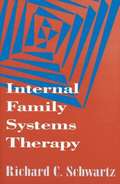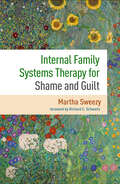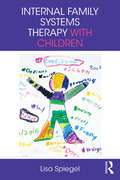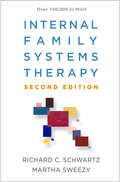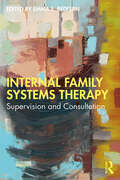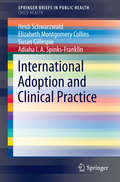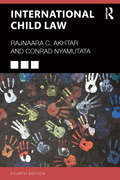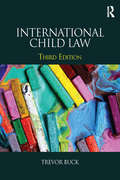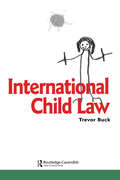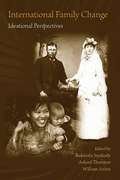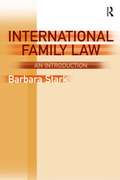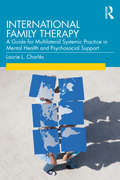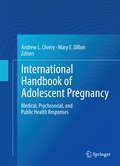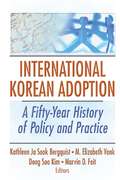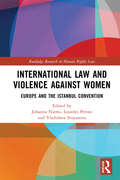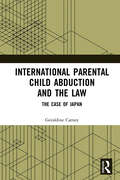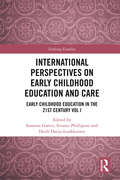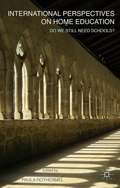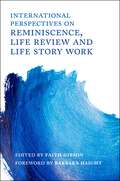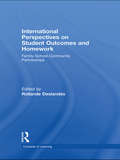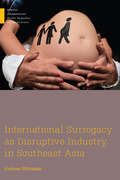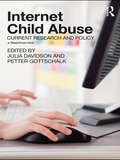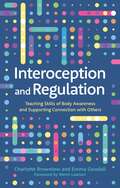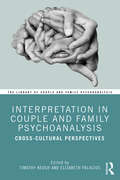- Table View
- List View
Internal Family Systems Therapy
by Richard C. SchwartzMost theorists who have explored the human psyche have viewed it as inhabited by subpersonalities. Beginning with Freud's description of the id, ego, and superego, these inner entities have been given a variety of names, including internal objects, ego states, archetypes and complexes, subselves, inner voices, and parts. Regardless of name, they are depicted in remarkably similar ways across theories and are viewed as having powerful effects on our thoughts and feelings.In his important new book, Richard C. Schwartz applies systems concepts of family therapy to this intrapsychic realm. The result is a new understanding of the nature of people's subpersonalities and how they operate as an inner ecology, as well as a new method for helping people change their inner worlds. Called the Internal Family Systems (IFS) model, this approach is based on the premise that people's subpersonalities interact and change in many of the same ways that families or other human groups do. The model provides a usable map of this intrapsychic territory and explicates its parallels with family interactions.The IFS model can be used to illuminate how and why parts of a person polarize with one another, creating paralyzing inner alliances that resemble the destructive coalitions found in dysfunctional families. It can also be utilized to tap core resources within people. Drawing from years of clinical experience, the author offers specific guidelines for helping clients release their potential and bring balance and harmony to their subpersonalities so they feel more integrated, confident, and alive. Schwartz also examines the common pitfalls that can increase intrapsychic fragmentation and describes in detail how to avoid them. Finally, the book extends IFS concepts and methods to our understanding of culture and families, producing a unique form of family and couples therapy that is clearly detailed and has straightforward instructions for treatment.Offering a comprehensive approach to human problems that allows therapists to move fluidly between the intrapsychic and family levels, this book will appeal to both individual- and family-oriented therapists. Easily integrated with other orientations, the IFS model provides a nonpathologizing way of understanding problems or diagnoses, and a clearly delineated way to create an enjoyable, collaborative relationship with clients.
Internal Family Systems Therapy
by Richard C. SchwartzApplying family systems concepts to the intrapsychic realm, the Internal Family Systems (IFS) model proposes that individuals' subpersonalities interact and change in many of the same ways as do families and other human groups. Seasoned practitioner Richard C. Schwartz illuminates how parts of a person can form paralyzing inner alliances resembling the destructive coalitions found in dysfunctional families, and provides straightforward guidelines for incorporating the IFS model into treatment. A valuable text and clinical resource, the book demonstrates in step-by-step detail how therapists can help individuals, couples, and families tap core resources, bring balance and harmony to their subpersonalities, and feel more integrated, confident, and alive.intrapsychic territory and explicates its parallels with family interactions.The IFS model can be used to illuminate how and why parts of a person polarize with one another, creating paralyzing inner alliances that resemble the destructive coalitions found in dysfunctional families. It can also be utilized to tap core resources within people. Drawing from years of clinical experience, the author offers specific guidelines for helping clients release their potential and bring balance and harmony to their subpersonalities so they feel more integrated, confident, and alive. Schwartz also examines the common pitfalls that can increase intrapsychic fragmentation and describes in detail how to avoid them. Finally, the book extends IFS concepts and methods to our understanding of culture and families, producing a unique form of family and couples therapy that is clearly detailed and has straightforward instructions for treatment.Offering a comprehensive approach to human problems that allows therapists to move fluidly between the intrapsychic and family levels, this book will appeal to both individual- and family-oriented therapists. Easily integrated with other orientations, the IFS model provides a nonpathologizing way of understanding problems or diagnoses, and a clearly delineated way to create an enjoyable, collaborative relationship with clients.
Internal Family Systems Therapy for Shame and Guilt
by Martha SweezyRich in clinical examples, this book offers a fresh perspective on the roles of shame and guilt in psychological distress and presents a step-by-step framework for treatment. Martha Sweezy explains how the principles of Internal Family Systems (IFS) therapy are ideally suited to helping trauma survivors and other clients who struggle with debilitating shame to understand and heal psychic parts wounded in childhood. Annotated case illustrations show and explain IFS techniques in action. Other useful features include boxed therapeutic exercises, decision trees, and pointers to help therapists avoid or overcome common pitfalls.
Internal Family Systems Therapy with Children
by Lisa SpiegelInternal Family Systems Therapy with Children details the application of IFS in child psychotherapy. The weaving together of theory, step-by-step instruction, and case material gives child therapists a clear roadmap for understanding and utilizing the healing power of this modality. In addition, any IFS therapist will deepen their understanding of the theory and practice of Internal Family Systems by reading how it is practiced with children. This book also covers the use of IFS in parent guidance, an important aspect of any therapeutic work with families or adult individuals with children. The poignant and humorous vignettes of children’s therapy along with their IFS artwork make it an enjoyable and informative read. Applies the increasingly-popular Internal Family Systems model to children Integrates theory, step-by-step instruction, and case material to demonstrate to therapists how to use IFS with children Contains a chapter on using IFS in parent guidance Includes a foreword by Richard Schwartz, the developer of the Internal Family Systems model
Internal Family Systems Therapy, Second Edition (Guilford Family Therapy Ser.)
by Richard C. Schwartz Martha SweezyNow significantly revised with over 70% new material, this is the authoritative presentation of Internal Family Systems (IFS) therapy, which is taught and practiced around the world. IFS reveals how the subpersonalities or "parts" of each individual's psyche relate to each other like members of a family, and how--just as in a family--polarization among parts can lead to emotional suffering. IFS originator Richard Schwartz and master clinician Martha Sweezy explain core concepts and provide practical guidelines for implementing IFS with clients who are struggling with trauma, anxiety, depression, eating disorders, addiction, and other behavioral problems. They also address strategies for treating families and couples. IFS therapy is listed in SAMHSA's National Registry of Evidence-Based Programs and Practices. New to This Edition *Extensively revised to reflect 25 years of conceptual refinement, expansion of IFS techniques, and a growing evidence base. *Chapters on the Self, the body and physical illness, the role of the therapist, specific clinical strategies, and couple therapy. *Enhanced clinical utility, with significantly more "how-to" details, case examples, and sample dialogues. *Quick-reference boxes summarizing key points, and end-of-chapter summaries.
Internal Family Systems Therapy: Supervision and Consultation
by Emma E. RedfernInternal Family Systems Therapy: Supervision and Consultation showcases the skills of Richard C. Schwartz and other leading IFS consultants and supervisors. Using unique case material, models, and diagrams, each contributor illustrates IFS techniques that assist clinicians in unblending and accessing Self-energy and Self-leadership. The book features examples of clinical work with issues such as bias, faith, sexuality, and sexual hurts. Individual chapters focus on therapist groups, such as Black Therapists Rock, and on work with specific populations, including children and their caregivers, veterans, eating disordered clients, therapists with serious illnesses, and couples. This thought-provoking book offers an opportunity for readers to reflect on their own supervision and consultation (both the giving and receiving of it). It explores what is possible and preferable at different stages of development when using the IFS model.
International Adoption and Clinical Practice
by Heidi Schwarzwald Elizabeth Montgomery Collins Susan Gillespie Adiaha I. A Spinks-FranklinNo matter how positive the intent of prospective parents, international adoption is fraught with emotional, medical, administrative, linguistic, and geopolitical issues. And while a wide range of professionals supports adopted children and their families in adjusting to the inherent changes and disruptions, the pediatrician's tasks--identifying and treating existing health problems and preventing numerous others--are particularly complex. International Adoption and Clinical Practice equips pediatricians with a comprehensive set of tools for establishing a long-term care plan and creating interventions to promote healthy development. This concise guide overviews the intricacies of the international adoption process and how they can affect the pediatrician's job, from potential pitfalls in collecting medical data from a child's birth country to tracking health concerns into adolescence and young adulthood. Developmental and behavioral issues including attachment, language acquisition, identity development, and consequences of abuse and neglect are also examined in this context. Figures, tables, and reference lists complement current information on topics such as: Epidemiology and demographics of international adoption. Pre-adoption evaluation of medical records. Guidelines for diagnostic testing, screening, laboratory evaluations, and immunizations. Common mental health issues faced by adopted children and their families. Long-term and adult outcomes of international adoption. Relevant policy issues and areas for future study. Every child deserves a safe and healthy home, and International Adoption and Clinical Practice gives pediatricians an in-depth framework for helping to make this possible as children make the transition to a new country and the next stage of their lives.
International Child Law
by Alisdair A. Gillespie Trevor Buck Lynne Ross Sarah Sargent Rajnaara Akhtar Conrad NyamutataThis book examines the rights of the child using the global framework of the United Nations International Convention on the Rights of the Child 1989. Analysing both public and private international legal aspects, this cross-disciplinary text promotes a holistic understanding of the ongoing development of child law, children’s rights and the protection of the child. In-depth analyses of the following topic areas are included: Childhood in the digital age; Child labour; International parental child abduction; Inter-country adoption; Sexual exploitation; Children and armed conflict; and Indigenous children. These topics are contextualised with further chapters on the concept of childhood and children’s rights, the international legal framework in which the Convention operates and a substantive chapter on the Convention itself. This fourth edition has been updated and revised, including a new chapter dealing with issues arising from childhood in the age of unprecedented digital technological advancements; a crucial issue for childhood experiences in modern times. This edition also includes new case studies, recent legal developments in the field of international child law, and inclusion of broader scholarship to capture diverse views on international law and child law. The aim of this book is to provide the reader with an accessible, informed, critical and scholarly account of the international law framework relating to children. Drawing on a range of legal and other disciplines, this book remains a valuable resource for those in the course of study and research in this area.
International Child Law
by Trevor BuckInternational Child Law examines and discusses the international legal framework and issues relating to children. Analysing both public and private international legal aspects, this cross-disciplinary text promotes an understanding of the ongoing development of child law, children’s rights and the protection of the child. Examining the theoretical background to the law, and providing a concise and clear overview of the instruments and institutions that protect children internationally, this text then focuses on key themes and issues in child law and children’s rights. This new edition has been updated and revised throughout, including expanded material on the UN Convention on the Rights of the Child, as well as discussion of recent landmark developments on the law relating to recruiting child soldiers as a result of Lubanga (2012). The third edition also includes a new case study feature that critically considers key themes and issues in international child law in a real world context. Drawing on a range of legal and other disciplines, International Child Law is a valuable resource for those in the course of study and research in this area.
International Child Law
by Trevor BuckInternational Child Law examines the international laws for children at both a global and a regional level. In particular the UN Convention on the Rights of the Child is described and critically assessed, while at the regional level the child in Europe is examined and how far the ECHR is engaged as a vehicle to progress childrens rights. Other key issues, increasing regulated by international child law, are spotlighted: child labour, child abduction and inter-country adoption.This book provides the reader with a sound understanding of the international law framework and issues relating to children and is a useful resource to those undertaking advanced study and or research in this area.
International Family Change: Ideational Perspectives
by Arland Thornton Rukmalie Jayakody William AxinnMany dimensions of family life have changed. Age at marriage has risen, arranged marriages and extended families have declined, intergenerational relationships have been altered, and contraceptive usage has become widespread. Until now, most explanations have focused on structural influences that emphasize changes in social and economic circumstanc
International Family Law: An Introduction
by Barbara StarkInternational law has become part of everyday family law practice, as lawyers everywhere are confronted with questions regarding the rights of 'mail-order' brides, the adoption of children from other countries, the abduction of children by foreign parents, and domestic violence victims seeking asylum. Indeed, globalization is transforming family law, even as families themselves are being redefined. This book provides a practical overview of such issues and also examines the ways in which culture shapes family law in different countries. It provides students with a useful introduction to challenging, complicated and fascinating issues in international family law. Finally, by incorporating a comparative perspective, it gives readers an opportunity to re-examine their own legal systems.
International Family Therapy: A Guide for Multilateral Systemic Practice in Mental Health and Psychosocial Support
by Laurie L CharlésInternational Family Therapy brings the international plane and its emphasis on the global community of states to systemic family therapy. Informed by a coherent, multilateral perspective, each chapter covers a specific topic, including: discussions on the basis of state sovereignty and the role of international human rights law; the concept of human security and psychosocial risk to vulnerable populations; and the international economics and trade of public mental health initiatives for families across the globe. Written in an accessible style and peppered with vignettes and descriptive case examples, the text encourages the reader to better understand and implement family systems approaches from the perspective of the international system, with a focus on cultural considerations and best practice throughout. Combining key theoretical tenets of family therapy and essential knowledge of international relations relevant to global mental health, International Family Therapy is an essential guide for family therapy practitioners interested in working internationally.
International Handbook of Adolescent Pregnancy
by Andrew L. Cherry Mary E. DillonThe rates are on the decline worldwide. But adolescent pregnancies still occur, placing millions of girls each year at risk for medical complications and social isolation and their babies for severe health problems-especially when prenatal care is inadequate or nonexistent. But as the opportunity for young women and girls increases around the world, adolescent pregnancy will continue to decline. Featuring reports from countries across the developed and developing worlds, the International Handbook of Adolescent Pregnancy analyzes the scope of the problem and the diversity of social and professional responses. Its biological/ecological perspective identifies factors influencing childhood pregnancy, as well as outcomes, challenges and needs of very young mothers as they differ across nations and regions. Salient comparisons are made as cultural contexts and community support vary widely and attention is paid to issues such as child marriage, LGBT concerns and the impact of religion and politics on health care, particularly access to contraception, abortion and other services. This global coverage heightens the understanding of readers involved in care, education and prevention programs and otherwise concerned with the psychosocial development, reproductive health and general well-being of girls. Included in the Handbook: Biological influences of adolescent pregnancy. Adolescent maternal health and childbearing. Adolescent pregnancy and mental health. International perspectives on adolescent fathers. Adolescent pregnancy as a feminist issue. Adolescent pregnancy as a social problem. Plus viewpoints from more than thirty countries. As a unique source of up-to-date findings and clear-headed analysis, the International Handbook of Adolescent Pregnancy is a go-to reference for practitioners and researchers in maternal and child health, pediatrics, adolescent medicine and global health.
International Korean Adoption: A Fifty-Year History of Policy and Practice
by Kathleen Ja Sook Bergquist M. Elizabeth Vonk Dong Soo Kim Marvin D. FeitDiscover the roots of international transracial adoption International Korean Adoption: A Fifty-Year History of Policy and Practice explores the long history of international transracial adoption. Scholars present the expert multidisciplinary perspectives and up-to-date research on this most significant and longstanding form of international child welfare practice. Viewpoints and research are discussed from the academic disciplines of psychology, ethnic studies, sociology, social work, and anthropology. The chapters examine sociohistorical background, the forming of new families, reflections on Korean adoption, birth country perspectives, global perspectives, implications for practice, and archival, historical, and current resources on Korean adoption. International Korean Adoption: A Fifty-Year History of Policy and Practice provides fresh insight into the origins, development, and institutionalization of Korean adoption. Through original research and personal accounts, this revealing text explores how Korean adoptees and their families fit into their family roles--and offers clear perspectives on adoption as child welfare practice. Global implications and politics, as well as the very personal experiences are examined in detail. This source is a one-of-a-kind look into the full spectrum of information pertaining to Korean adoption. Topics in International Korean Adoption: A Fifty-Year History of Policy and Practice include: adoption from the Korean perspective historical origins of Korean adoption in the United States adjustments of young adult adoptees marketing to choosy adopters ethnic identity perspectives on the importance of race and culture in parenting birth mothers' perspectives sociological approach to race and identity representations of adoptees in Korean popular culture adoption in Australia and the Netherlands much, much more International Korean Adoption: A Fifty-Year History of Policy and Practice is illuminating reading for adoptees, adoptive parents, practitioners, educators, students, and any child welfare professional.
International Law and Violence Against Women: Europe and the Istanbul Convention (Routledge Research in Human Rights Law)
by Vladislava Stoyanova Johanna Niemi Lourdes PeroniThis book offers an in-depth and critical analysis of the Istanbul Convention, along with discussions on its impact and implications. The work highlights the place of the Convention in the landscape of international law and policies on violence against women and equality. The authors argue that the Convention with its emphasis on integrated and comprehensive policies has an important role in promoting equality, but they also note the debates on “genderism” that the Convention has triggered in some member states. The book analyses central concepts of the Convention, including violence, gender and due diligence. It takes up major commitments of the parties to the Convention, including support and services to victims, criminal law provisions and protection of migrant women against violence. The book thus makes a major contribution to the development of national laws, policies and practice. It provides a valuable guide for policy-makers, students and academics in international human rights law, criminal and social law, social policy, social work and gender studies.
International Parental Child Abduction and the Law: The Case of Japan
by Geraldine CarneyJapan has faced widespread scrutiny for failing to properly address international parental child abduction involving its citizens. This book examines how and why Japan has come to have this tarnished image, its response, and how it might manage these disputes in the future. In particular, the book explores how Japan engages with international legal frameworks to manage international parental child abduction and what this means, in reality, for Japanese people and others who come under its wide umbrella. A focus of this examination is how the key international treaty, the Hague Convention of 25 October 1980 on the Civil Aspects of International Child Abduction, has fared since being introduced in Japan in 2014. Case studies of parental child abduction involving Japan are used throughout to illustrate the legal and social concepts discussed in the book. The struggles of both abducting and left-behind parents across fluid international borders reveal seismic social and philosophical shifts in Japan that continue to shape its legal landscape. This book will be a useful resource for students of Japanese Studies, Sociolegal Studies, Comparative Law and International Law.
International Perspectives on Early Childhood Education and Care: Early Childhood Education in the 21st Century Vol I (Evolving Families)
by Susanne Garvis Sivanes Phillipson Heidi Harju-LuukkainenThe first volume in this Early Childhood Education and Care in the 21st Century: International Teaching, Family and Policy Perspectives miniseries provides a snapshot of early childhood education and care from 19 different countries around the world. The intention is to provide a description for the policy and provision for young children and their families in each of the unique contemporary contexts. The selection of countries includes every continent in the world to provide variety across cultures, socio-economic status, location, population and other unique factors. Some chapters also share the development and history of early childhood in their country, including economic and political transitions that lead to changes in early childhood provision and policy. The book provides essential takeaways for early childhood educators, researchers, early childhood organisations, policy makers and those interested to know more about early childhood education within an international perspective.
International Perspectives on Home Education
by Paula RothermelThis collection brings together the research of an eclectic mix of leading names in home-based education studies worldwide. It uses home education to explore contemporary education outside of school and place it into a global, political and critical context, and will be essential reading for home educators, academics and policymakers alike.
International Perspectives on Reminiscence, Life Review and Life Story Work
by Bob Woods Robyn Fivush Faith Gibson Peter G. Coleman Cheryl Svensson Christine Ivani-Chalian Maureen Robinson Christine Bryden Pam Schweitzer Kate De Medeiros Barbara Haight Thomas W. Pierce Ann N. Elliott Jordan Booker TsuAnn Kuo Elizabeth MacKinlay Emily Mroz Susan Bluck Brian De Vries Jeffrey D. Webster Philippe Cappeliez Sara Stemen Marian Ferguson Geraldine Gallagher Juliette Shellman Julia McNeil Gerben J. Westerhof Mary O'Brien Tyrrell Assumpta A. Ryan Loriena Yancura Esther GieschenExamining recent research and practice on reminiscence, life review and life story work, this book offers critical accounts of the rapidly growing and extensive global literature, and highlights the continuing relevance and effectiveness of these therapeutic methods.The book includes examples of international practical projects, involving people of all ages, life circumstances, and levels of physical and cognitive functioning. Contributions from contemporary practitioners and researchers give a nuanced appraisal of the methods of engagement and creativity arising from the purposeful recall of our personal pasts. Chapters include reviews of technology, ethical issues including end of life care, working with people with mental health conditions, and working with people with dementia.
International Perspectives on Student Outcomes and Homework: Family-School-Community Partnerships (Contexts of Learning)
by Rollande DeslandesThis synthesis of the latest knowledge on homework presents unique findings by researchers from various countries and diverse professional backgrounds. It approaches the topic of homework from several perspectives, including its political and cultural contexts aspects of parental involvement and parent-child relationships school contexts and practices observable impacts It highlights homework-specific concerns and considers two principal solutions. Firstly, support initiatives from schools and communities. Secondly, improved homework design, aimed at attracting greater student interest and promoting communication within families. Recommendations for practice and future research are also discussed. A political analysis shows that current confusion about homework might stem from a tension between two prevailing ideologies, one stressing students’ improved achievement in competing economies, and the other privileging collaboration between the school, family and community. This book considers how both teachers and parents can ensure a balance between the child’s school life and his or her overall development. Certain community resources are available to parents and students, but these in no way absolve parents of the responsibility to maintain an interest in their child’s school activities. International Perspectives on Student Outcomes and Homework proposes ideas and actions of relevance to everyone interested in the issue: school administrations, teachers in training and in practice, parents, and researchers eager to contribute to the advancement of knowledge in the field. It is a perfect companion to International Perspectives on Contexts, Communities and Evaluated Innovative Practices, also edited by Rollande Deslandes, and published simultaneously by Routledge.
International Surrogacy as Disruptive Industry in Southeast Asia (Medical Anthropology)
by Andrea WhittakerDuring the last two decades, a new form of trade in commercial surrogacy grew across Asia. Starting in India, a “disruptive” model of surrogacy offered mass availability, rapid accessibility, and created new demands for surrogacy services from people who could not afford or access surrogacy elsewhere. In International Surrogacy as Disruptive Industry in Southeast Asia, Andrea Whittaker traces the development of this industry and its movement across Southeast Asia following a sequence of governmental bans in India, Nepal, Thailand, and Cambodia. Through a case study of the industry in Thailand, the book offers a nuanced and sympathetic examination of the industry from the perspectives of the people involved in it: surrogates, intended parents, and facilitators. The industry offers intended parents the opportunity to form much desired families, but also creates vulnerabilities for all people involved. These vulnerabilities became evident in cases of trafficking, exploitation, and criminality that emerged in southeast Asia, leading to greater scrutiny on the industry as a whole. Yet the trade continues in new flexible hybrid forms, involving the circulation of reproductive gametes, embryos, surrogates, and ova donors across international borders to circumvent regulations. The book demonstrates the need for new forms of regulation to protect those involved in international surrogacy arrangements.
Internet Child Abuse: Current Research and Policy
by Julia DavidsonInternet Child Abuse: Current Research and Policy provides a timely overview of international policy, legislation and offender management and treatment practice in the area of Internet child abuse. Internet use has grown considerably over the last five years, and information technology now forms a core part of the formal education system in many countries. There is however, increasing evidence that the Internet is used by some adults to access children and young people in order to ‘groom’ them for the purposes of sexual abuse; as well as to produce and distribute indecent illegal images of children. This book presents and assesses the most recent and current research on internet child abuse, addressing: its nature, the behaviour and treatment of its perpetrators, international policy, legislation and protection, and policing. It will be required reading for an international audience of academics, researchers, policy-makers and criminal justice practitioners with interests in this area.
Interoception and Regulation: Teaching Skills of Body Awareness and Supporting Connection with Others
by Emma Goodall Charlotte BrownlowThere are some things that many of us take for granted - such as knowing when we are hot or cold, feel hungry, or need to go to the toilet. But how do we know these things, and why do some people struggle to recognise them? Interoception - the ability to identify and act on physical sensations inside the body - is crucial to human well-being. It underpins physical developmental milestones, such as toilet-training, as well emotional ones, such as the ability to self-regulate. Research shows that Autism often co-occurs with poor interoceptive sense.This practical and informative book demystifies interoception and provides tools to help boost interoceptive abilities. It summarises the latest research, explores how interoceptive difficulties can be identified, suggests strategies to manage feelings and emotions, and explains how to support individuals in 'tuning in' to themselves.
Interpretation in Couple and Family Psychoanalysis: Cross-Cultural Perspectives (The Library of Couple and Family Psychoanalysis)
by Timothy Keogh Elizabeth PalaciosThis collection of contemporary clinically-oriented papers covers a range of theoretical approaches to the fundamentally important technical issue of interpretation. It offers thought-provoking, cross-cultural clinical perspectives about interpretation with illustrations from cutting edge clinical practice with couples and families. Divided into three sections, the first part of the book examines interpretation within the broader field of psychoanalysis, and notes how it has been applied to couple and family psychoanalysis. Part II considers the current use of interpretation with couples, including how it informs assessment, while Part III focuses on its application with families and considers a broad range of key topics, including the nature of family, social and intergenerational links, the arrival of a newborn, same sex couples’ families, bereavement in a family, and families with adolescent children. Each chapter includes a lively discussion piece. Interpretation in Couple and Family Psychoanalysis: Cross-Cultural Perspectives represents a major contribution to the field of couple and family psychoanalysis. It reflects the fruits of an unparalleled era of global collaboration and the resultant re-shaping of approaches to clinical practice with couples and families. Mental health professionals dealing with couples and families will find it to have immediate relevance to their clinical work, either in their institutional or private practice.
